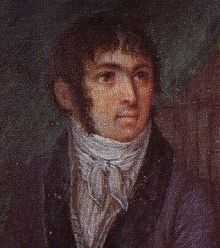Fabre d'Olivet

Antoine Fabre d'Olivet (December 8, 1767, Ganges, Hérault – March 25, 1825, Paris) was a French author, poet and composer whose Biblical and philosophical hermeneutics influenced many occultists, such as Eliphas Lévi, Gerard Encausse and Édouard Schuré.
His best known works are on the research of the Hebrew language and the history of the human race entitled (1) The Hebraic Tongue Restored: And the True Meaning of the Hebrew Words Re-Established and Proved by their Radical Analysis, and (2) Hermeneutic Interpretation of the Origin of the Social State of Man and of the Destiny of the Adamic Race. Other works of renown are on the sacred art of music entitled Music Explained as Science and as Art and Considered in its Analog Relationship with Religious Mysteries, Ancient Mythology and the History of the Earth, and a translation and commentary of Pythagoras's thirty-six Golden Verses.
His interest in Pythagoras and the resulting works started a revival of Neo-Pythagoreanism that would later influence many occultists and new age spirtitualists. He attempted an alternate interpretation of Genesis, based on what he considered to be connections between the Hebrew alphabet and hieroglyphs. The discovery of the Rosetta Stone and the subsequent decipherment of Egyptian hieroglyphs that followed would prove much of this particular work technically mistaken. He was declared a non-person by Napoleon I and condemned by the Pope.
An interesting story involves his healing a deaf boy of his hearing impairment, and then having Napoleon officially declare that he is never again to heal another person of deafness. He indicates that he kept the letter of notice out of amusement. Outside of esotericism, he also invented the poetic measure of eumolpique. He had an argument with Lord Byron over the British poet's publishing of a play, "Cain", which questioned a Christian view of Genesis. d'Olivet believed the play would destroy Christian beliefs and undermine the spirit of the English people at the very time they needed some faith to endure a very difficult life. Byron's response went something like, "I'm only a poet; I don't know anything about these philosophical concerns of yours!" The play was very popular in England.